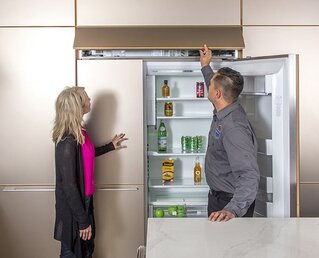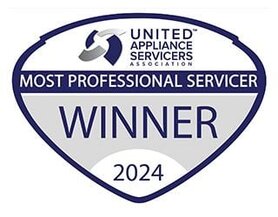How Long do Refrigerators Last on Average?

And How Can I Make Mine Last Longer?
Before giving up on your current refrigerator and buying a new one, it’s important to understand how long refrigerators are expected to last, and how to take care of them to get the most value out of every refrigerator you ever own.
How Long Do Refrigerators Last?
On average, refrigerators are expected to last between 10-15 years. After that, your fridge may start losing cooling efficiency, causing your utility bills to spike and your food to spoil faster (if it can’t maintain a stable interior temp). Additionally, individual components of the refrigerator will wear out over time. Some are easy to replace, others require significantly more expensive repairs, such as sealed system repair. Proper maintenance of your appliance throughout its entire lifespan is the key to making your refrigerator last 15 or even 20 years.
Improve the Efficiency of Your Refrigerator
Efficiency matters with your refrigerator, and not just because it’ll save you money on groceries and utilities. The more efficient a refrigerator is, the less wear and tear there will be on its parts over the years, leading to an extended lifespan.
There are several different models of refrigerators, including top freezer, side-by-side, bottom freezer, and French door. Typically, the classic top freezer refrigerator is the most efficient (using 10-25% less energy than bottom freezer styles), since by design the compressor, which dissipates heat, is located further from the refrigerator compartment. This prevents heat from bleeding back into the system. That said, we understand that the more modern designs are popular now. Luckily, there are things you can do to increase the efficiency of your fridge no matter what model you get:
- Keep the Doors Closed: You should never leave the doors open for an extended period. The more cold air you let out, the harder your refrigerator will have to work to cool the interior back down.
- Increase the Temperature Setting: For optimal preservation of your food, your fridge should be set between 37-40°F and your freezer between 0-5° The default settings of your refrigerator may be colder than this, so be sure to increase them to save money and reduce wear and tear on parts.
- Don’t Overload on Ice: Be conscious of how much ice you use. Automatic ice makers increase a refrigerator’s energy use by 14-20%. While they are convenient, consider turning it off when you have enough ice, or even go back to ice cube trays. The more you use your ice machine, the harder your fridge will have to work on a day-to-day basis, putting excessive wear on its parts.
- Help Your Fridge Stay Cool: Your refrigerator is constantly working to keep things cool, but that doesn’t mean you can’t help it do its job properly. Let all food cool entirely before placing it in the fridge, always put a lid on food you store in the fridge, and if you’re designing a kitchen, do not place the refrigerator next to any heat source, like an oven or dishwasher.
Without too much extra effort, you can improve the efficiency of your refrigerator to help it easily last for the long haul.
Extend the Life of Your Refrigerator
Beyond helping your fridge operate efficiently, there are a few habits that you should also adopt to prevent expensive repairs:
- Clean the Condenser Coils: Condenser coils are a critical part of every refrigerator, as this is where the refrigerant transfers heat from the interior of the fridge to the outside air. Like all nooks and crannies in your house, they tend to collect dirt, dust, hair, and other debris over time, which prevents them from efficiently releasing heat. A dirty condenser forces your refrigerator to work longer and harder to keep cool. You can gently vacuum the coils with a soft-brush attachment every 6 months to keep them working at their best. Refer to your appliance manual for help finding your refrigerator’s condenser or schedule an appointment with a local appliance repair company to have them cleaned for you.
- Clean the Door Gaskets: The gaskets around the doors of your refrigerator and freezer keep cold air from escaping. Spills in your refrigerator can create sticky spots around the door, which over time tug on and loosen the gasket, preventing a tight seal. The buildup of gunk on the gasket over time can also prevent a tight seal. Take a damp sponge or cloth and wipe down the gaskets and the fridge interior regularly to avoid excessive buildup. If you notice mold around your gasket seal, use a disinfectant cleanser to kill it.
- Clean out the Vents: Inside your refrigerator there are vents that circulate air to keep food cold. Use a warm, wet rag to wipe out any food, liquid, or dust caught in the vents to prevent blockages or uneven distribution of cool air. Some units also have air filters that should be replaced from time to time. Letting the vents get too clogged can lead to more serious issues, so doing this often is advised.
- Change Your Water Filter: If your refrigerator has a built-in water dispenser or icemaker, it likely has a water filter as well. If yours does, it should be changed every six months to keep your water free of bacteria and other harmful filtrates. Replacing your water filter will also help you avoid permanent damage to your water dispenser and ice maker caused by excessive buildups.
- Make Sure It’s Level: If your refrigerator is tilted, even just slightly, it will put excessive strain on the motor to simply do its job. Grab a level to make sure your fridge isn’t askew.
- Organization is Key:
- Avoid Storage on Top of the Fridge: While it may be tempting to store miscellaneous items on top of your fridge, doing so can interfere with its ability to dissipate heat. You should always leave the top of the refrigerator clear and leave at least a one-inch gap between it and over-fridge cabinets.
- Don’t Overfill It or Leave it Empty: Proper air circulation is crucial to extending the life of your refrigerator. Overfilling it will prevent air from flowing freely and overwork the compressor. Leaving your fridge empty will cause similar excess strain on the compressor, because it forces your refrigerator to keep a larger volume of air cool.
Regularly maintaining your refrigerator will help avoid expensive repairs, catch any issues before they get serious, and give your refrigerator a fair shot of lasting for a longer period of time.
Time to Repair or Replace?
Most refrigerators are expected to last 10-15 years. The rule of thumb is that if your fridge is less than 8 years old and encounters an issue, opt for a repair. If the fridge is more than 15 years old and needs repair, it may be cheaper to just invest in a new appliance altogether. Of course, this is a hard-and-fast rule, and the reality may differ case by case. Some things to look out for include:
- Condensation Build-Up: Condensation in your refrigerator is caused by a variety of underlying issues and can lead to moldy food. If you notice a constant “sweating” inside your fridge, call a technician right away to analyze the problem.
- Loud Noises: Noises coming from any appliance can be alarming, especially your refrigerator. While no fridge is completely silent, if you start to notice that it is much louder than usual, you will likely want to call a repairman to check out the issue before it gets any worse.
- Freezing Freezer: Freezers are intended to keep your food frozen, but that doesn’t mean they should be frozen themselves. Ice buildup on the walls of your freezer can indicate an issue with your compressor or condenser coils. You can try to unplug your refrigerator to defrost the freezer, but if the problem persists you will want to call a tech to identify what might be going on.
There is no rulebook for identifying if your refrigerator problems will lead to a repair or a replacement. If you are not sure whether to repair or replace your refrigerator, call a local appliance repair company for guidance. They can help identify the issue, and most will give you an honest opinion of whether your refrigerator is worth saving.
Appliances are Meant to Last
Although appliances are expensive, they are built to last. You should never need to replace your refrigerator every few years like you do your smartphone or laptop. Whether you invest in a high-tech refrigerator or stick with the basics to simply get the job done, your refrigerator will be a part of your kitchen for years to come. That said, proper care and maintenance of your fridge is the key to getting your money’s worth.
Not sure if your refrigerator has hit the end of its life? If you live in one of our service areas, give us a call or schedule an appointment online and we’ll come take a look to give you a sense of what to expect from your appliance moving forward and the costs associated with any repairs.









